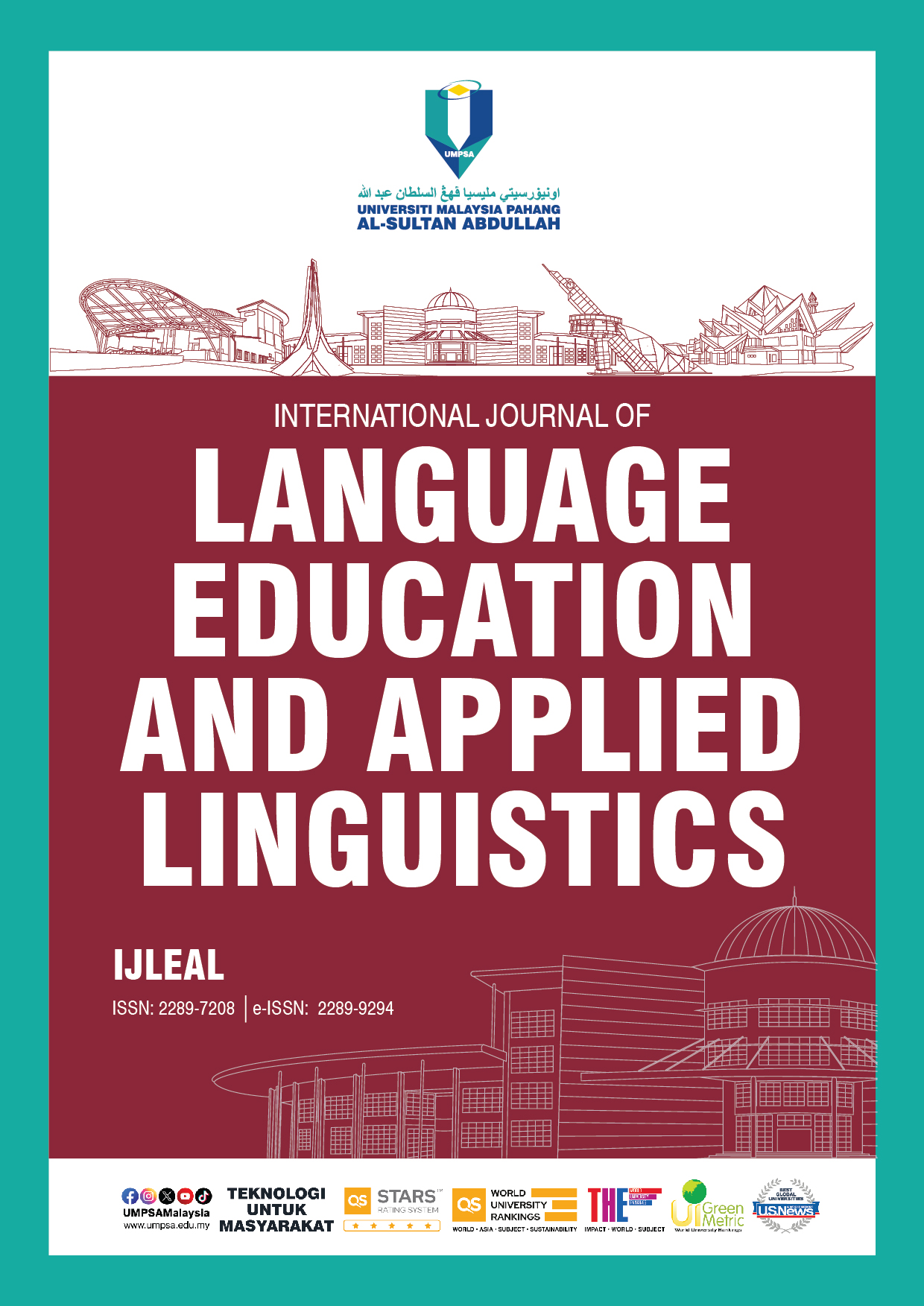Exploring Parental Involvement in Children's English as a Second Language (ESL) Learning Across Different Socioeconomic Contexts
DOI:
https://doi.org/10.15282/ijleal.v15i1.11083Keywords:
ESL students, Malaysian classroom, Parental involvement, Socioeconomic statusAbstract
This study explores parents’ perceptions of their involvement in their children's English as a Second Language (ESL) learning in Malaysia, with a focus on the B40 (lower income) and T20 (high income) groups. Through qualitative interviews with 12 participants, this research investigates the influence of socioeconomic background on parental roles, perceptions of involvement, and the perceived effectiveness of their efforts. Thematic analysis reveals key themes: the significance of parental involvement, the positive effects of such involvement, distinct parental roles, and various forms of engagement. The findings highlight that while all parents, regardless of socioeconomic status, recognize the importance of their involvement, their approaches differ significantly. B40 parents tend to focus on motivation and emotional support, whereas T20 parents take a more hands-on approach, often supplementing school learning with additional resources. The study underscores the necessity for targeted support to address the varying needs of different socioeconomic groups, advocating for equitable resources and tailored programs to empower B40 parents with effective tutoring skills, thereby promoting more inclusive educational outcomes.
References
Ahmad, N. S., & Sulaiman, N. (2020). Demographic and socio-economic characteristics, household food security status, and academic performance among primary school children in North Kinta, Perak, Malaysia. Malaysian Journal of Medicine and Health Sciences, 16, 26–33.
Alias, Z., & Kamal, S. S. L. A. (2024). Factors influencing parental involvement in children’s English as a second language learning: A case study of B40 and T20 families in Malaysia. MANU Jurnal Pusat Penataran Ilmu dan Bahasa, 35(1), 222-243. https://doi.org/10.51200/manu.v35i1.5196
Alias, N. Z., Kamal, S. S., Jamil, H., & Abdullah, M. K. (2023). A systematic review of understanding parental involvement in children’s ESL learning: What the literature says? International Journal of English Language and Literature Studies, 12(2), 172–183. https://doi.org/10.55493/5019.v12i2.4810
Çalışkan, E. F., & Ulaş, A. H. (2022). The effect of parent-involved reading activities on primary school students' reading comprehension skills, reading motivation, and attitudes towards reading. International Electronic Journal of Elementary Education, 14(4), 509-524. https://doi.org/10.26822/iejee.2022.260
Cresswell, J. (2013). Qualitative inquiry and research design: Choosing among five approaches. Sage.
Department of Statistics Malaysia. (2021). ICT use and access by individuals and households survey report, Malaysia, 2021. Retrieved April 28, 2022, from https://www.dosm.gov.my/portal-main/release-content/ict-use-and-access-by-individuals-and-households-survey-report-malaysia-2021
Epstein, J. L., Sanders, M. G., Simon, B. S., Salinas, K. C., Jansorn, N. R., & Voorhis, F. L. (2002). School, family, and community partnerships: Your handbook for action. Corwin Press.
Forey, G., Besser, S., & Sampson, N. (2015). Parental involvement in foreign language learning: The case of Hong Kong. Journal of Early Childhood Literacy, 0(0), 1–31.
Froiland, J. M. (2020). A comprehensive model of preschool through high school parent involvement with emphasis on the psychological facets. School Psychology International, 42(2), 103–131. https://doi.org/10.1177/0143034320981393
Ghani, F. A., Rasli, M. A. M., & Ahmad Razali, N. H. (2020). Parental Role and Challenges in Science, Technology, Engineering, and Mathematics (STEM). European Proceedings of Social and Behavioural Sciences, 100, 889-894. https://doi.org/10.15405/epsbs.2020.12.05.97
Green, C. L., Walker, J. M. T., Hoover-Dempsey, K. V., & Sandler, H. M. (2007). Parents' motivations for involvement in children's education: An empirical test of a theoretical model of parental involvement. Journal of Educational Psychology, 99(3), 532–544. https://doi.org/10.1037/0022-0663.99.3.532
Grace, M., & Gerdes, A. C. (2019). Parent-teacher relationships and parental involvement in education in Latino families. Contemporary School Psychology, 23(4), 444–454. https://doi.org/10.1007/s40688-018-00218-9
Guetterman, T., Yaqub, T., Talaat, N., & Fetters, M. (2018). A systematic approach for accurate translation of instruments: Experience with translating the Connor–Davidson resilience scale into Arabic. Methodological Innovations, 10(3), 1-10.
Hanafiah, N. I. M., Rosly, N. S., & Ahmad, N. (2024). Relationship between parents’ involvement with students’ interest and achievements in mathematics learning. Jurnal Intelek, 19(2), 218–229. https://doi.org/10.24191/ji.v19i2.26633
Hedenbro, M., & Rydelius, P. (2018). Children’s abilities to communicate with both parents in infancy were related to their social competence at the age of 15. Acta Paediatrica, 108(1), 118–123. https://doi.org/10.1111/apa.14430
Hill, N. E. (2020). Parent academic involvement as related to school behavior, achievement, and aspirations: Demographic variations across adolescence. Child Development, 75(5), 1491–1509.
Ibrahim, A., & Jamil, B. H. (2012). The nature of parental involvement in the schooling process in Katsina State. Journal of Education and Learning, 1(2), 37-50. https://doi.org/10.5539/jel.v1n2p37
Ishak, N. A., Mohd Satar, N., & Zakaria, R. H. (2020). Parental involvement in education among urban families in Malaysia. Journal of Southeast Asian Studies, 25(2), 60–85. https://doi.org/10.22452/jati.vol25no2.4
Kamal, S. S. L. A. (2020). An exploration of social, cultural, and contextual elements surrounding struggling readers of English as a second language in the Malaysian classroom. (Doctoral dissertation, The University of Sheffield). https://etheses.whiterose.ac.uk/13611/
Kizildag, A. (2009). Teaching English in Turkey: Dialogues with teachers about the challenges in public primary schools. International Electronic Journal of Elementary Education, 1(3), 188–201.
Lin, S., Masnan, A. H., & Hashim, N. H. (2023). A systematic literature review on levels and effects of parental involvement in children’s learning. International Journal of Evaluation and Research in Education, 12(3), 1253–1253. https://doi.org/10.11591/ijere.v12i3.24293
Murshidi, G. A., Daoud, S., Derei, R. A., Alhamidi, H., Jabir, W., & Sayed, N. (2023). Parental involvement in English as foreign language learners’ education: Challenges and solutions in a post-pandemic era. International Journal of Educational Research Open, 5, 100297. https://doi.org/10.1016/j.ijedro.2023.100297
Lee, Y.-C. (2010). Parents’ perceived roles and home practices in supporting Taiwanese children’s English language and literacy learning. English Teaching and Learning, 34(1), 1–53. http://rportal.lib.ntnu.edu.tw/handle/20.500.12235/12529
Majid, N. A., Puteh, F., & Muhammad, F. (2005). English language literacy in rural community setting: An analysis of the environment to encourage and sustain the development of English language learning outside the classroom. Faculty of Management and Human Resource Development Centre, University Technology of Malaysia. Retrieved from https://eprints.utm.my/3789/
Ministry of Economy. (2021). Twelfth Malaysia Plan, 2021-2025. https://rmke12.ekonomi.gov.my/en
Merriam, S. B., & Tisdell, E. J. (2016). Qualitative research: A guide to design and implementation (4th ed.). Jossey-Bass.
Ren, L., Hu, B. Y., & Zhang, X. (2020). Disentangling the relations between different components of family socioeconomic status and Chinese preschoolers’ school readiness. Family Process, 60(1), 216-234. https://doi.org/10.1111/famp.12534
Rosinah, H., Mohd Mahzan, A., Abdul Razaq, A., & Anuar, A. (2019). Parent involvement in children learning to academic excellence. Social Sciences, Education and Humanities, 2. https://doi.org/10.32698/GCS.0183
Ruslin, et al. (2022). Semi-structured interview: A Methodological Reflection on The Development of a Qualitative Research Instrument in Educational Studies. Journal of Research and Method Education, 12(1), 22-29.
Syaza, N., Ahmad, S., & Sulaiman, N. (2020). Demographic and socio-economic characteristics, household food security status, and academic performance among primary school children in North Kinta, Perak, Malaysia. Malaysian Journal of Medicine and Health Sciences, 16(SUPP6), 2636–9346. http://psasir.upm.edu.my/id/eprint/90248/1/4upm.pdf
Sanders, M. R., Divan, G., Singhal, M., Vellemen, R., Turner, K., Michelson, D., & Patel, V. (2021). Scaling up parenting interventions is critical for attaining the sustainable development goals. Child Psychiatry & Human Development. https://doi.org/10.1007/s10578-021-01171-0
Şengonul, T. (2022). A review of the relationship between parental involvement and children’s academic achievement and the role of family socioeconomic status in this relationship. Pegem Journal of Education and Instruction, 12(2). https://doi.org/10.47750/pegegog.12.02.04
Skwarchuk, S.-L., Sowinski, C., LeFevre, J.-A., & Koitka, L. (2022). Relations between the home learning environment and the literacy and mathematics skills of eight-year-old Canadian children. Education Sciences, 12(8), 513. https://doi.org/10.3390/educsci12080513
Subedi, K. R. (2021). Determining the sample in qualitative research. Scholars’ Journal, 4, 1–13. https://doi.org/10.3126/scholars.v4i1.42457
Vasileiou, K., Barnett, J., Thorpe, S., & Young, T. (2018). Characterising and justifying sample size sufficiency in interview-based studies: Systematic analysis of qualitative health research over a 15-year period. BMC Medical Research Methodology, 18(1), 1–18. https://doi.org/10.1186/s12874-018-0594-7
Wati, S. (2016). Parental involvement and English language teaching to young learners: Parents’ experience in Aceh. Proceeding of International Conference on Teacher Training and Education, 1(1).
Walker, J. M. T., Wilkins, A. S., Dallaire, J. R., Sandler, H. M., & Hoover-Dempsey, K. V. (2005). Parental involvement: Model revision through scale development. The Elementary School Journal, 106(2), 85–104. https://doi.org/10.1086/499193
Yukich, C. A.-M. (n.d.). Teaching and learning challenges facing primary school teachers of students from non-English speaking backgrounds (Master’s thesis, Unitec Institute of Technology, Auckland, New Zealand). https://typeset.io/papers/teaching-and-learning-challenges-facing-primary-school-u3ri08omez
Yin, W. K. (2022). The relationship between psychosocial invitation and parental involvement in out-of-school time programs: A literature review. International Journal of Academic Research in Progressive Education and Development, 11(4). https://doi.org/10.6007/ijarped/v11-i4/16091
Downloads
Published
Issue
Section
License
Copyright (c) 2025 The Author(s)

This work is licensed under a Creative Commons Attribution-NonCommercial 4.0 International License.




